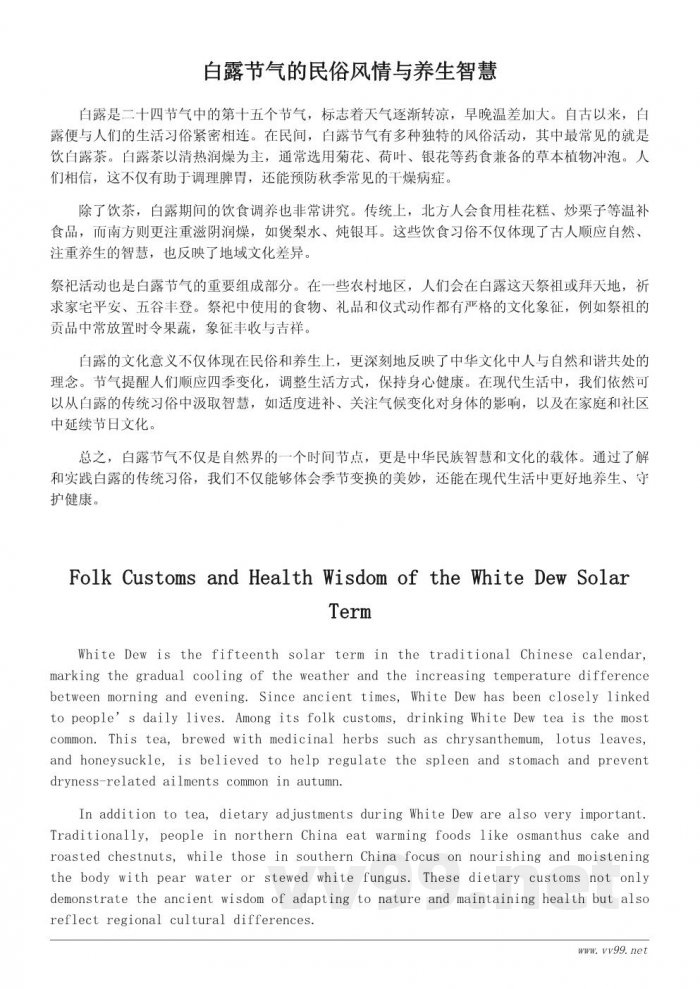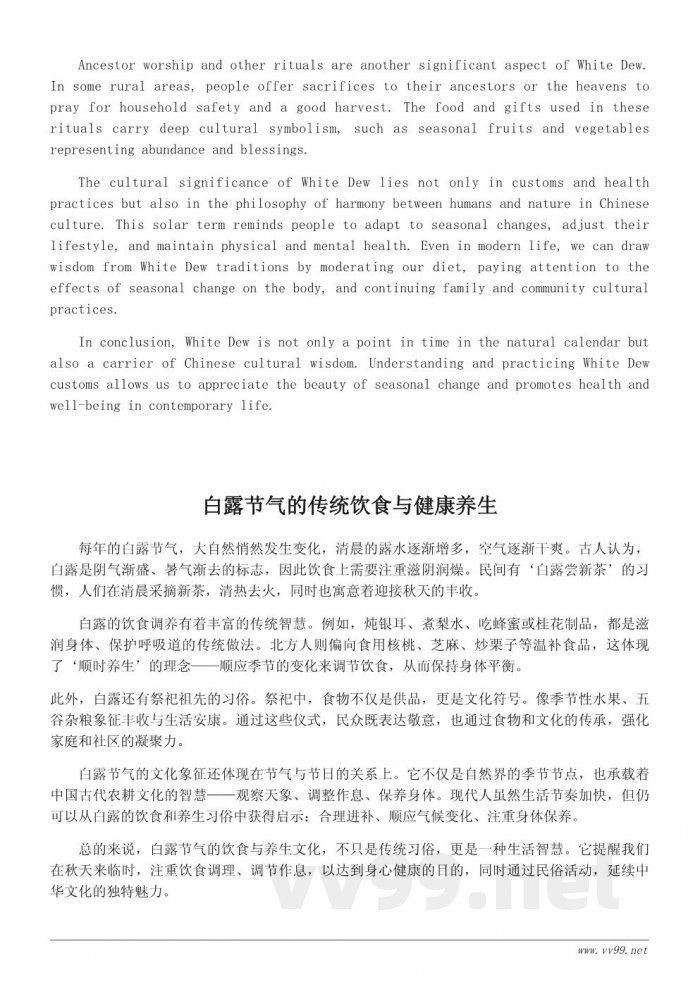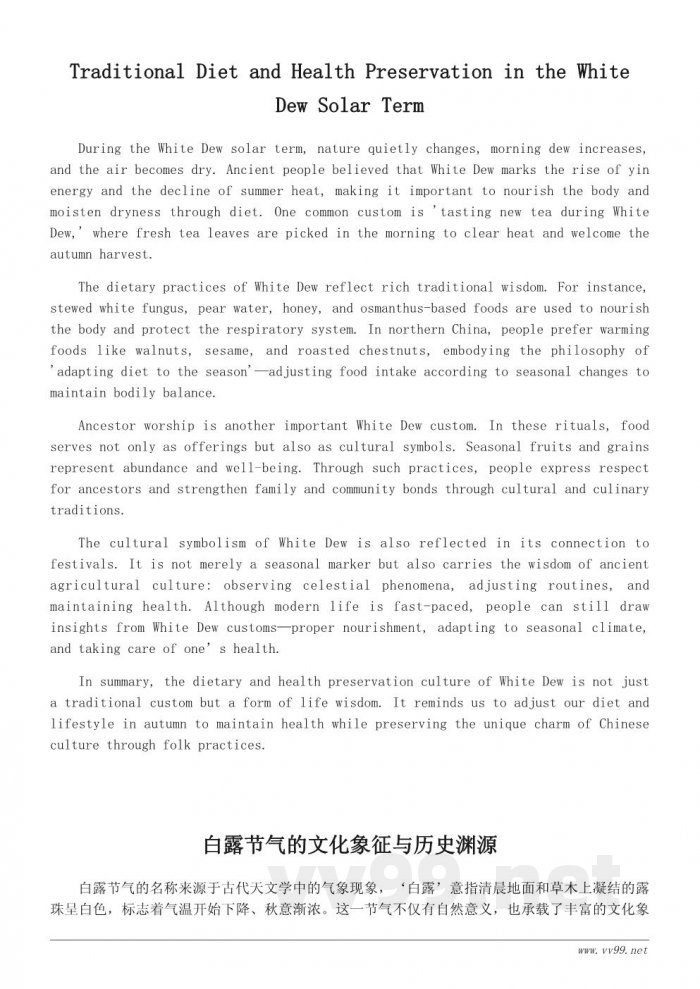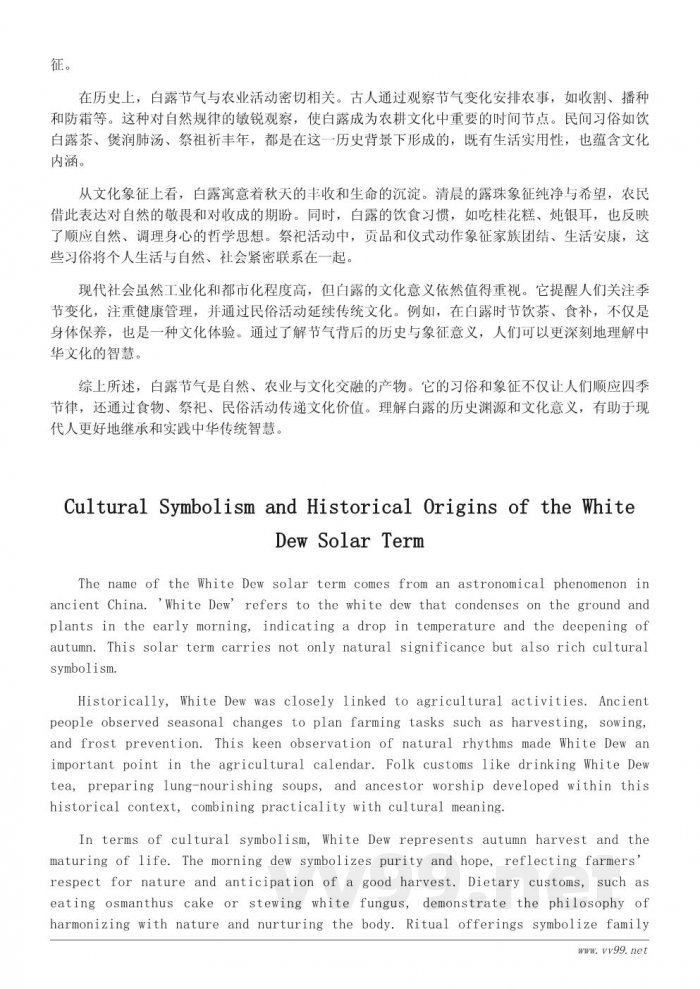白露节气的民俗风情与养生智慧
白露是二十四节气中的第十五个节气,标志着天气逐渐转凉,早晚温差加大。自古以来,白露便与人们的生活习俗紧密相连。在民间,白露节气有多种独特的风俗活动,其中最常见的就是饮白露茶。白露茶以清热润燥为主,通常选用菊花、荷叶、银花等药食兼备的草本植物冲泡。人们相信,这不仅有助于调理脾胃,还能预防秋季常见的干燥病症。
除了饮茶,白露期间的饮食调养也非常讲究。传统上,北方人会食用桂花糕、炒栗子等温补食品,而南方则更注重滋阴润燥,如煲梨水、炖银耳。这些饮食习俗不仅体现了古人顺应自然、注重养生的智慧,也反映了地域文化差异。
祭祀活动也是白露节气的重要组成部分。在一些农村地区,人们会在白露这天祭祖或拜天地,祈求家宅平安、五谷丰登。祭祀中使用的食物、礼品和仪式动作都有严格的文化象征,例如祭祖的贡品中常放置时令果蔬,象征丰收与吉祥。
白露的文化意义不仅体现在民俗和养生上,更深刻地反映了中华文化中人与自然和谐共处的理念。节气提醒人们顺应四季变化,调整生活方式,保持身心健康。在现代生活中,我们依然可以从白露的传统习俗中汲取智慧,如适度进补、关注气候变化对身体的影响,以及在家庭和社区中延续节日文化。
总之,白露节气不仅是自然界的一个时间节点,更是中华民族智慧和文化的载体。通过了解和实践白露的传统习俗,我们不仅能够体会季节变换的美妙,还能在现代生活中更好地养生、守护健康。
Folk Customs and Health Wisdom of the White Dew Solar Term
White Dew is the fifteenth solar term in the traditional Chinese calendar, marking the gradual cooling of the weather and the increasing temperature difference between morning and evening. Since ancient times, White Dew has been closely linked to people’s daily lives. Among its folk customs, drinking White Dew tea is the most common. This tea, brewed with medicinal herbs such as chrysanthemum, lotus leaves, and honeysuckle, is believed to help regulate the spleen and stomach and prevent dryness-related ailments common in autumn.
In addition to tea, dietary adjustments during White Dew are also very important. Traditionally, people in northern China eat warming foods like osmanthus cake and roasted chestnuts, while those in southern China focus on nourishing and moistening the body with pear water or stewed white fungus. These dietary customs not only demonstrate the ancient wisdom of adapting to nature and maintaining health but also reflect regional cultural differences.
Ancestor worship and other rituals are another significant aspect of White Dew. In some rural areas, people offer sacrifices to their ancestors or the heavens to pray for household safety and a good harvest. The food and gifts used in these rituals carry deep cultural symbolism, such as seasonal fruits and vegetables representing abundance and blessings.
The cultural significance of White Dew lies not only in customs and health practices but also in the philosophy of harmony between humans and nature in Chinese culture. This solar term reminds people to adapt to seasonal changes, adjust their lifestyle, and maintain physical and mental health. Even in modern life, we can draw wisdom from White Dew traditions by moderating our diet, paying attention to the effects of seasonal change on the body, and continuing family and community cultural practices.
In conclusion, White Dew is not only a point in time in the natural calendar but also a carrier of Chinese cultural wisdom. Understanding and practicing White Dew customs allows us to appreciate the beauty of seasonal change and promotes health and well-being in contemporary life.
白露节气的传统饮食与健康养生
每年的白露节气,大自然悄然发生变化,清晨的露水逐渐增多,空气逐渐干爽。古人认为,白露是阴气渐盛、暑气渐去的标志,因此饮食上需要注重滋阴润燥。民间有‘白露尝新茶’的习惯,人们在清晨采摘新茶,清热去火,同时也寓意着迎接秋天的丰收。
白露的饮食调养有着丰富的传统智慧。例如,炖银耳、煮梨水、吃蜂蜜或桂花制品,都是滋润身体、保护呼吸道的传统做法。北方人则偏向食用核桃、芝麻、炒栗子等温补食品,这体现了‘顺时养生’的理念——顺应季节的变化来调节饮食,从而保持身体平衡。
此外,白露还有祭祀祖先的习俗。祭祀中,食物不仅是供品,更是文化符号。像季节性水果、五谷杂粮象征丰收与生活安康。通过这些仪式,民众既表达敬意,也通过食物和文化的传承,强化家庭和社区的凝聚力。
白露节气的文化象征还体现在节气与节日的关系上。它不仅是自然界的季节节点,也承载着中国古代农耕文化的智慧——观察天象、调整作息、保养身体。现代人虽然生活节奏加快,但仍可以从白露的饮食和养生习俗中获得启示:合理进补、顺应气候变化、注重身体保养。
总的来说,白露节气的饮食与养生文化,不只是传统习俗,更是一种生活智慧。它提醒我们在秋天来临时,注重饮食调理、调节作息,以达到身心健康的目的,同时通过民俗活动,延续中华文化的独特魅力。
Traditional Diet and Health Preservation in the White Dew Solar Term
During the White Dew solar term, nature quietly changes, morning dew increases, and the air becomes dry. Ancient people believed that White Dew marks the rise of yin energy and the decline of summer heat, making it important to nourish the body and moisten dryness through diet. One common custom is 'tasting new tea during White Dew,' where fresh tea leaves are picked in the morning to clear heat and welcome the autumn harvest.
The dietary practices of White Dew reflect rich traditional wisdom. For instance, stewed white fungus, pear water, honey, and osmanthus-based foods are used to nourish the body and protect the respiratory system. In northern China, people prefer warming foods like walnuts, sesame, and roasted chestnuts, embodying the philosophy of 'adapting diet to the season'—adjusting food intake according to seasonal changes to maintain bodily balance.
Ancestor worship is another important White Dew custom. In these rituals, food serves not only as offerings but also as cultural symbols. Seasonal fruits and grains represent abundance and well-being. Through such practices, people express respect for ancestors and strengthen family and community bonds through cultural and culinary traditions.
The cultural symbolism of White Dew is also reflected in its connection to festivals. It is not merely a seasonal marker but also carries the wisdom of ancient agricultural culture: observing celestial phenomena, adjusting routines, and maintaining health. Although modern life is fast-paced, people can still draw insights from White Dew customs—proper nourishment, adapting to seasonal climate, and taking care of one’s health.
In summary, the dietary and health preservation culture of White Dew is not just a traditional custom but a form of life wisdom. It reminds us to adjust our diet and lifestyle in autumn to maintain health while preserving the unique charm of Chinese culture through folk practices.
小提示:上面此文档内容仅展示完整文档里的部分内容, 若需要下载完整文档请 点击免费下载完整文档 。





